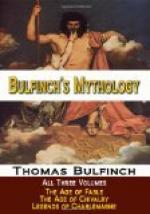The dwarf, approaching Huon, said, in a sweet voice, and in Huon’s own language, “Duke of Guienne, why do you shun me? I conjure you, in Heaven’s name, speak to me.” Huon, hearing himself addressed in this serious manner, and knowing that no evil spirit would dare to use the holy name in aid of his schemes, replied, “Sir, whoever you are, I am ready to hear and answer you.” “Huon, my friend,” continued the dwarf, “I always loved your race, and you have been dear to me ever since your birth. The gracious state of conscience in which you were when you entered my wood has protected you from all enchantments, even if I had intended to practise any upon you. If these monks, these nuns, and even your friend Sherasmin, had had a conscience as pure as yours, my horn would not have set them dancing; but where is the monk or the nun who can always be deaf to the voice of the tempter, and Sherasmin in the desert has often doubted the power of Providence.”
At these words Huon saw the dancers overcome with exertion. He begged mercy for them, the dwarf granted it, and the effect of the horn ceased at once; the nuns got rid of their partners, smoothed their dresses, and hastened to resume their places in the procession. Sherasmin, overcome with heat, panting, and unable to stand on his legs, threw himself upon the grass, and began, “Did not I tell you”—He was going on in an angry tone, but the dwarf, approaching, said, “Sherasmin, why have you murmured against Providence? Why have you thought evil of me? You deserved this light punishment; but I know you to be good and loyal; I mean to show myself your friend, as you shall soon see.” At these words he presented him a rich goblet. “Make the sign of the cross on this cup,” said he, “and then believe that I hold my power from the God you adore, whose faithful servant I am, as well as you.” Sherasmin obeyed, and on the instant the cup was filled with delicious wine, a draught of which restored vigor to his limbs, and made him feel young again. Overcome with gratitude, he threw himself on his knees, but the dwarf raised him, and bade him sit beside him, and thus commenced his history:
“Julius Caesar, going by sea to join his army, was driven by a storm to take shelter in the island of Celea, where dwelt the fairy Glorianda. From this renowned pair I draw my birth. I am the inheritor of that which was most admirable in each of my parents: my father’s heroic qualities, and my mother’s beauty and magic art. But a malicious sister of my mother’s, in revenge for some slight offence, touched me with her wand when I was only five years old, and forbade me to grow any bigger; and my mother, with all her power, was unable to annul the sentence. I have thus continued infantile in appearance, though full of years and experience. The power which I derive from my mother I use sometimes for my own diversion, but always to promote justice and to reward virtue. I am able and willing to assist you, Duke of Guienne, for I know the errand on which you come hither. I presage for you, if you follow my counsels, complete success; and the beautiful Clarimunda for a wife.”




